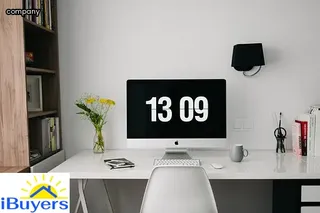When attempting to sell a home, homeowners often face the dilemma of deciding who should be the buyer. Traditionally, buyers have been individuals or families looking for a place to live and call their own.
On the other hand, investors are buyers who purchase property with the intent of making it into a profitable venture. Knowing the difference between these two types of buyers is key to understanding the benefits and drawbacks of selling one's home to an investor.
Traditional buyers can offer more stability due to their intention of living in a property, while investors may have more flexible financial resources that could lead to a quicker sale. Homeowners should also consider whether they would prefer an all-cash offer from an investor or if they're open to taking out a loan as part of the deal with traditional buyers.
In addition, using an investor may come with drawbacks such as fewer chances for negotiation and higher closing costs than when dealing with individuals or families. Understanding the differences between these two types of buyer is essential for any homeowner considering selling their home in order to make an informed decision about who should be the buyer.

When it comes to selling your house, working with an investor can be a great option for some people. There are many benefits to this method, such as a fast and hassle-free sale, no need to make repairs or updates, and often the ability to receive cash instead of waiting for financing.
However, there are also drawbacks that must be taken into account before making a decision. For example, investors typically offer less money than what is offered on the open market due to their desire for a quick sale and profit margin.
Additionally, you may have limited access to legal help if disputes arise during the process. Ultimately, it's important to weigh all of the pros and cons carefully before deciding if selling your house to an investor is right for you.
When it comes to finding a reputable home investor, there are several tips that can be followed. First, research the investor’s reputation and track record of success.
Ask questions such as how long they have been in business, what their success rate is, and what types of homes they typically purchase. It’s also important to read online reviews from past customers who have sold their homes to the investor.
Before signing any paperwork, make sure to get a complete understanding of the terms and conditions being offered. Additionally, it is wise to consult with an attorney or financial advisor before making a final decision.
Furthermore, when considering selling your home to an investor, weigh out the pros and cons so that you know exactly what you are getting into. Make sure all parties involved understand their rights and obligations before committing to anything.
By following these tips for finding a reputable home investor, you will be better informed on the process and able to make an educated decision about selling your home.

When considering to negotiate with an investor for the sale of your home, it is important to be aware of all the pros and cons. While there can be great advantages to selling to an investor such as getting a cash offer quickly, avoiding repairs and renovations, and no need for staging, there can also be drawbacks that should not be overlooked.
These potential issues could include not being able to get the full market value of your home since investors typically offer less than what a home is worth, limited negotiation power when it comes to price, and possibly having to pay closing costs. Other considerations might include a lack of access to certain resources such as real estate agents or appraisers.
Taking the time to do research and understand the process is key before making any decisions about selling your home to an investor.
The price for a home sold to an investor is determined by several important factors. Firstly, the condition of the home affects its value, as any potential repairs or upgrades are taken into consideration.
Other aspects of the property, such as its location and size, can also affect the final price. Additionally, market trends can alter what investors will pay for a house.
The current state of the real estate market in that area will be taken into account when determining the fair price for a home. Also, if there are other homes up for sale in the same vicinity with similar characteristics and features, this could influence how much an investor is willing to spend on your property.
Finally, any incentives offered by the seller can also raise or lower the purchase price.

Selling your home to an investor offers a range of advantages compared to selling through a traditional buyer. For starters, investors are often more likely to make a cash offer, meaning you can receive the funds quickly and avoid the long wait of waiting for a bank loan approval.
Additionally, since investors don’t require mortgage financing they can usually close the deal faster than buyers who need to go through the process of obtaining a loan approval. Furthermore, depending on the situation, you may be able to negotiate flexible terms with an investor such as taking payments over time or offering some other form of consideration in exchange for buying your home.
Conversely, when selling to an individual buyer you’re typically limited to one lump sum payment and have less flexibility in negotiating terms. Another benefit is that investors are typically less picky about minor repairs and cosmetic changes that must be made prior to sale, so you may not have to invest as much time or money into making these improvements before closing the deal.
On the downside, investors may offer lower prices than what you could get from a traditional buyer because they must factor in their own costs and profits when making their offer. Additionally, some sellers may feel uncomfortable dealing directly with large investment companies or firms instead of individuals and find that it’s easier to connect on an emotional level when dealing face-to-face with someone interested in buying their home.
Selling your home to an investor can be a tempting option for those who need to sell quickly, however, it is important to understand the risks involved. The most glaring risk of selling your home to an investor is that you may not get the full market value for your property.
Since investors are usually looking for a bargain, they will typically offer a price that is much lower than what could be obtained on the open market. Another potential risk is that the investor may require certain repairs or renovations as part of the sale agreement which would be an additional expense for the seller.
Additionally, investors typically want to close quickly so you may find yourself in a rush to move out and leave everything behind. Finally, since all transactions with investors involve contracts, it's essential to thoroughly read and understand any agreement before signing anything.
Knowing the risks associated with selling your home to an investor can help you make an informed decision when deciding whether or not it is right for you.

When deciding whether or not to sell your home to an investor, there are many factors to consider. First, one should think about the benefits of selling to an investor.
These include a fast and hassle-free sale with little paperwork and no realtor commissions or fees. Furthermore, an investor can often pay cash for your home, allowing you to close quickly.
On the other hand, there are some drawbacks to selling your home to an investor that must also be taken into account. For instance, investors tend to offer less money than the market value of a home due to their need for profit.
Additionally, if you require financing for the sale, it may be difficult to find a lender willing to work with an investor. Finally, you won't have access to the same services typically provided by a real estate agent such as guidance on pricing and marketing the property.
Taking these factors into consideration can help you make an informed decision on whether selling your home is right for you.
Researching potential investors before making the decision to sell your home to one is key. It's important to know their background and experience in the industry, what type of services they offer, how much they are willing to pay for your home, and how long the process may take.
It’s wise to ask for references from previous customers to get an idea of how they’ve worked with other homeowners in the past. Additionally, you should make sure that the investor is licensed and insured so that you can rest assured that any transactions you enter into are secure and protected.
Researching online reviews can also be beneficial in determining a potential investor’s trustworthiness and reliability. Taking the time to thoroughly research potential investors will help ensure a successful sale of your home.

Selling your home to an investor can be a great option for those who want a quick sale and are willing to accept less than the fair market value. However, there are a few common mistakes you should avoid in order to ensure that the process goes smoothly.
First, it is important to do your research on the investor and make sure they have a good reputation. Additionally, you should never sign any contracts without first consulting with an attorney or real estate agent, as investors may try to take advantage of unsuspecting sellers.
Lastly, if possible, try to negotiate with the investor so that you can get the highest price possible. By being aware of these common pitfalls and taking steps to protect yourself financially, you can maximize your chances of having a successful transaction when selling your home to an investor.
Before you consider selling your home to an investor, it is important to ask yourself a few key questions.
What are the potential benefits and drawbacks associated with this type of sale? How much money can I expect to receive from the sale? How quickly will I be able to close on the deal? Additionally, what fees or taxes may be associated with the transaction? Will I be able to take my personal belongings with me when I move out of the house or will they need to remain in the home until closing day? It's also smart to research any potential investors that you're considering working with and make sure they have a good reputation in their field.
By doing your due diligence prior to selling your home, you can ensure that you're entering into a fair arrangement.

When selling your home to an investor, it is important to understand the pros and cons associated with this type of transaction. Maximizing profit when selling to an investor requires careful planning and strategic decision-making.
Knowing how to negotiate terms and pricing can help ensure you get the most out of the sale. Researching market trends and local home values can provide insight into what price range will attract investors.
Being aware of any restrictions such as zoning laws or other permits that may be necessary for the sale can prevent unnecessary delays or financial losses. Additionally, presenting a clean, well-maintained property can increase its appeal and help you receive a better offer from potential buyers.
Determining the best time to list your property is also essential for achieving maximum profits. Utilizing the services of a real estate agent experienced in working with investors could be beneficial in navigating these processes successfully.
When considering the sale of your home, you may think that selling to a house investor is the only option. However, there are other viable alternatives which you should evaluate before making a decision.
For example, if you are looking for a quick sale, you could list your home on the open market or work with a real estate agent. This route generally takes longer to complete but can net more money in the end.
On the other hand, if time is of the essence and you need to close quickly, then selling your home to an investor might be the best option as it could potentially result in a fast transaction. Additionally, when selling directly to an investor there is no need to worry about costly repairs or staging – you can typically sell as-is and still get cash for your house.
That said, working with an investor also has its drawbacks; usually they will offer less than market value for your property so make sure you weigh out all of your options before deciding on which path to take.

When preparing your home for sale to an investor, there are several points to consider. Firstly, investors are looking for a property that has been well maintained and is in good condition.
This includes the interior and exterior of the home and any features such as a garden or a garage. Additionally, they look out for any potential repairs that may need to be made, such as replacing leaking pipes or damaged walls.
Furthermore, investors like homes with strong foundations, updated electrical systems and efficient heating systems. It is also important to make sure that all paperwork is up-to-date and all legal obligations have been met.
Lastly, you should make sure your property stands out from the others on the market by doing things such as presenting it nicely and making small improvements like adding fresh paint or new fixtures. These are just some of the things investors look for when deciding whether to buy a home.
Selling your home to an investor can offer many benefits such as a quick sale, no need for repairs and no realtor fees, but there are also drawbacks to consider. Before you sign the closing documents with an investor, it is important to understand all of the details and be prepared.
Knowing the right tactics will help ensure that you have a successful outcome when quickly closing the deal with an investor. Start by researching investors in your area, looking at their average closing times and any special requirements they may have.
Make sure you are aware of any applicable laws or regulations that could affect your situation. When negotiating, be sure to ask questions about the timeline, financing options, and possible contingencies so you can make an informed decision.
It's also essential to understand what rights and responsibilities come along with selling your home to an investor so that you know what to expect from them during the process. Most importantly, remain confident throughout the negotiation process and don't rush into anything without taking time to review all of your options.

When it comes to selling a home, homeowners have many options. One of these is to sell directly to an investor.
This can be a great way to sell the property quickly and easily, but before taking this route, it's important to understand the advantages and disadvantages of using professional services when selling to an investor. Professional services such as real estate agents can provide valuable assistance throughout the process by helping with paperwork, contracts, negotiations and more.
With their help, a homeowner can ensure that they get the best deal possible while still meeting all legal requirements. Additionally, agents are able to market the property effectively and reach out to potential buyers in order to find a suitable buyer quickly.
Along with this benefit comes added cost, however; typically in the form of commissions or fees that must be paid for these services. Overall, utilizing professional services when selling to an investor has its pros and cons but can ultimately be a great way for homeowners to get their home sold quickly and efficiently.
Working with an investment company to sell your home has both advantages and disadvantages. Investing in a home can be a great way to quickly liquidate your property for cash, but it is important to understand the full spectrum of financing options that come with the deal.
Home investment companies typically offer different payment plans to match the needs of their clients. For those who are looking for a fast sale, getting an all-cash offer upfront can be beneficial, however there are certain costs associated with this option such as closing fees and any other expenses necessary for the transaction.
If you don't need such a quick sale, installment payments can be negotiated with some companies or you can agree on terms where they take possession of the property while you continue making payments until the agreed upon purchase price is paid off. Regardless of which financing option you choose, it's important to consider all aspects of the deal before signing any agreement and make sure that all details have been properly discussed and disclosed between yourself and the investor.

When it comes to selling your home to an investor, understanding the tax implications can be a major factor in making the decision. Depending on your particular situation, there may be specific deductions, credits, or exemptions that apply when you sell a home for capital gain.
Additionally, you may be subject to different tax rates depending on whether you are selling as a principal residence or as an investment property. Furthermore, investors may offer various incentives such as paying off any existing liens or loans, which could also affect your tax liability.
It's important to consider all of these factors and consult with a qualified accountant or financial advisor before making any decisions.
Investors buy homes in many different ways. Some purchase homes through foreclosures, while others look to purchase a home from a homeowner who is looking to sell quickly.
Investors may also use wholesalers, who act as intermediaries between the investor and the homeowner, to facilitate a deal. Once an agreement is reached between the homeowner and investor, the investor will typically pay cash or arrange financing for the purchase.
The transaction may be completed in as little as two weeks, making it ideal for homeowners looking for a fast sale. When selling to an investor, there are both benefits and drawbacks that should be considered before making a decision.
On one hand, investors often pay cash and waive certain inspection contingencies, allowing the homeowner to close quickly on the sale of their home. On the other hand, selling to an investor means accepting less than what could be earned by listing with a real estate agent and offering competitive market rates.
Ultimately, it is up to each individual homeowner to weigh all of their options carefully and decide which route best meets their needs.

Investors are actively searching for homes to buy and resell for profit, and the reasons why they are interested in buying your home vary. Many of these investors have been in the business of flipping houses for a while and understand the current market trends.
Investors often offer quick cash closings on homes, allowing homeowners to avoid complicated financing processes or lengthy waiting periods associated with traditional real estate buyers. Additionally, because investors do not need to obtain bank financing or appraisals, they are less likely to back out of a deal due to changing circumstances.
Furthermore, an investor may be able to provide you with more money than you would get through a conventional sale, as they tend to purchase properties below their market value. On the other hand, selling your home to an investor may be slightly riskier than going through traditional channels since you will not have the same protections offered by a real estate agent or broker.
Investors can also involve additional costs like repairs that must be made before closing and may require extra paperwork from sellers than traditional buyers do. Ultimately, deciding whether selling your home to an investor is right for you depends on your individual financial situation and needs.
Investors usually pay cash for properties and typically purchase homes at a discount. While investors may be able to close quickly, they often don’t pay market value for your home.
On average, investors offer up to 80% of the fair market value of the home. This number can vary depending on the condition of the property, the location, and current market conditions.
Investors often take into account additional costs such as repairs, closing costs, and holding costs when determining how much to offer for a house. Despite not offering full value for your property, selling to an investor can be beneficial due to its simplicity and speed in comparison to other methods like listing with a realtor.
Ultimately deciding whether or not to accept an investor's offer is up to you as the seller, but understanding both the benefits and drawbacks will help you make an informed decision.
When an investor purchases a home, they typically have a plan of what they will do with the house. Some investors may choose to make repairs and updates to the home and then list it on the real estate market for sale.
Others may decide to rent out the house as an income property. But some investors also opt to keep the house as-is and use it as a rental, or even their own personal residence.
Each option comes with different benefits and drawbacks that need to be carefully considered by potential sellers. By understanding what exactly an investor intends to do with the property, sellers can gain insight into whether selling their home to an investor is right for them.
A: Wholesaling is a type of real estate investment strategy in which an investor purchases a property with the intent of quickly reselling it at a profit. Homeownership occurs when an individual or family purchases a home to use as their primary residence. Real estate investors who utilize the wholesaling strategy are typically interested in buying and selling properties quickly, rather than taking on the responsibility of long-term ownership.
A: Selling your single-family home to an investor can be a great option, as it is usually a much faster process than going through the traditional real estate market. Additionally, investors are often willing to pay cash for homes, which can make for a quicker closing time than waiting for a loan to go through. However, you may not receive full value for your home when selling it to an investor due to them aiming to acquire the property at a lower price than the market value.

A: Selling your home to an investor can provide a quick sale with fewer costs, but you will likely receive less than the full market value. To avoid scammers in the rental housing market, research potential investors thoroughly and get everything in writing. Be sure to understand all terms and conditions of any agreement before signing.
A: Foreclosed homes can provide investors with potentially substantial savings, since they are usually priced lower than similar homes on the market. Additionally, many foreclosed homes are sold in "as is" condition, so investors may have more flexibility when it comes to making renovations or repairs.
A: One of the primary benefits to selling a home to an investor is that it can be a fast and easy transaction, as investors may be willing to purchase a property in as-is condition and without making any repairs. Additionally, investors often offer cash payments without requiring the seller to pay closing costs. However, the main drawback is that investors usually offer lower prices than those offered by traditional buyers.
A: Investing in real estate as a house investor can provide great returns, diversify your portfolio, and potentially create a passive income stream. Additionally, you have the opportunity to build equity over time and benefit from potential tax advantages.
A: California Banks typically offer a variety of loan products to Atlanta house investors, such as mortgages and home equity loans.
A: The primary benefit of selling your home to an investor is that the process is often faster than a traditional sale. This can be time-saving when dealing with a pressing timeline or if you need to close quickly. On the other hand, investors typically offer less money than you would receive on the open market. Additionally, there may be fewer options for customizing the transaction, such as payment terms or contingencies.
A: The main benefit of selling a house to an equity investor is that the process can be completed quickly, usually in as little as a few days. This allows homeowners to avoid the lengthy timeline associated with traditional real estate sales. However, one potential drawback is that investors will typically offer less than market value for a home due to their need for a return on their investment.
A: House investors often purchase properties to generate a profit by renting or reselling them. They benefit from the potential for capital growth, rental income, and cash flow.
A: The NAR provides access to Multiple Listing Services (MLS) for house investors in Phoenix, which helps them find properties quickly and effectively.